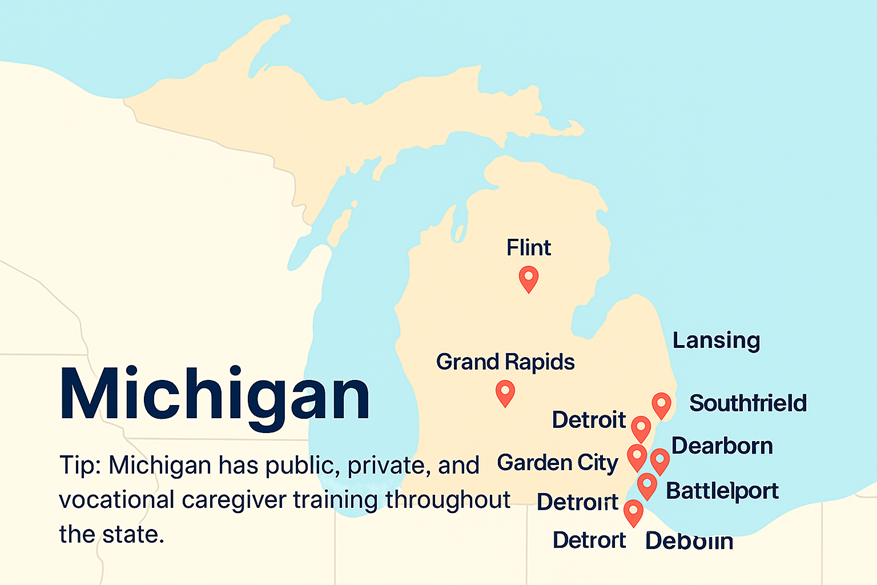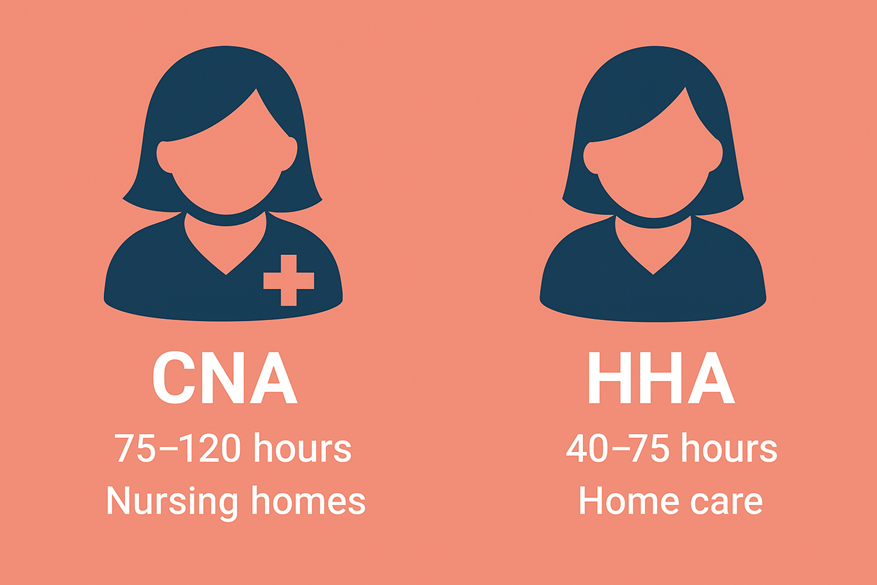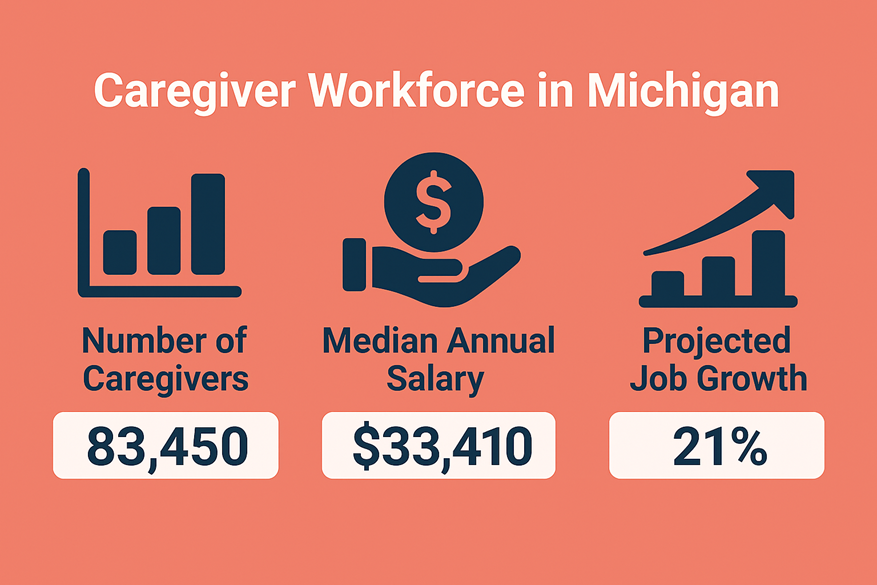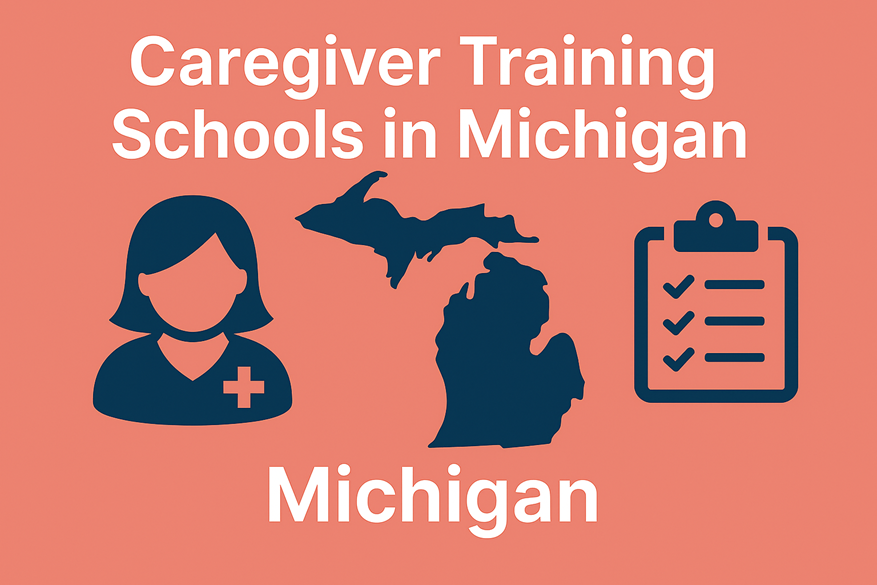Thinking about starting a career in caregiving? Whether you’re hoping to become a Certified Nursing Assistant (CNA) or a Home Health Aide (HHA), Michigan has plenty of programs to help you get started. Caregiving is more than just a job—it’s a deeply rewarding path where you support others during their most vulnerable moments. And the best part? You can train and start working in just a few weeks in many cases.
This guide breaks down everything you need to know about caregiver training in Michigan—from school options and certification steps to salaries and job outlook. Let’s help you find the right path forward.
Your Training Options in Michigan

Michigan offers several ways to train as a caregiver, and your choice may depend on your schedule, location, or budget. Most training programs fall under one of two categories:
Public & Private Colleges in Michigan
Many community colleges and private institutions offer CNA programs and occasionally HHA training. These schools are great for students looking for structured classes, campus resources, and sometimes financial aid.
Cities like Detroit, Lansing, Grand Rapids, and Ann Arbor are home to community colleges with reputable CNA programs.
List of Public & Private Colleges with CNA/HHA Programs
Vocational & Career Schools in Michigan
Career schools focus on getting you trained and job-ready—fast. Many of these programs are under 6 weeks long, and you’ll often find both CNA and HHA training, sometimes bundled together. These schools are ideal for career changers or adults looking to enter the healthcare workforce quickly.
You’ll find strong vocational options in places like Flint, Kalamazoo, Warren, and Southfield.
List of Vocational & Career Schools with Caregiver Training
CNA vs. HHA in Michigan: What’s the Difference?

Let’s clear up the difference between CNAs and HHAs in Michigan:
Certified Nursing Assistant (CNA):
- Must complete a state-approved training program (minimum 75 hours).
- Required to pass the Michigan CNA exam (written and skills test).
- Must be listed in the Michigan Nurse Aide Registry.
- Often works in nursing homes, hospitals, assisted living, and rehab centers.
- Can take vital signs, assist with hygiene, and report patient observations.
Home Health Aide (HHA):
- No statewide license required, but training is typically required by employers (40–75 hours depending on role).
- Works primarily in private homes or home health agencies.
- Duties include personal care, meal prep, light housekeeping, and companionship.
- May work under supervision of a nurse for Medicaid/Medicare-certified agencies.
Does Michigan Offer PCA Certification?
In Michigan, caregiver training primarily focuses on Certified Nursing Assistants (CNAs) and Home Health Aides (HHAs), but you might notice something missing—Personal Care Aides (PCAs). That’s because Michigan doesn’t formally recognize or license PCAs at the state level. Unlike CNAs, who must complete a state-approved training program and pass a competency exam to be listed on the Michigan Nurse Aide Registry, PCAs don’t go through a standardized certification process.
While some private agencies and training centers may offer PCA programs, they’re not overseen by the state’s health department. Instead, PCA roles are typically defined by individual employers, especially in private home care settings. These positions may involve non-medical support like bathing assistance, companionship, or light housekeeping, but without the clinical duties of a CNA. So, if you’re planning a caregiving career in Michigan, it’s usually best to aim for a CNA or HHA path. Not only are those roles more widely recognized, but they also come with clearer job standards, certification options, and better long-term opportunities. If your goal is to be job-ready, getting certified as a CNA or completing a structured HHA program will open more doors across the state.
In Michigan, many HHA roles don’t require certification unless working in a federally funded agency. However, having formal training makes you far more employable—and often better paid.
Michigan Caregiver Job Market (as of July 2025)

The demand for caregivers in Michigan is growing fast, especially with the state’s aging population.
- CNAs in Michigan earn between $32,500 – $41,000/year, depending on location, experience, and setting. Metro areas like Detroit, Ann Arbor, and Grand Rapids offer higher pay.
- HHAs typically earn between $28,000 – $36,000/year, with flexibility in schedule and location.
According to the U.S. Bureau of Labor Statistics and Michigan Works!:
- Michigan has over 4,000 open CNA positions statewide.
- Home health aide jobs are expected to grow by 20% through 2030, which is faster than the national average.
Tip: Rural areas and smaller cities often struggle to fill CNA/HHA roles—meaning better chances of getting hired fast!
Licensing & Certification Steps (CNA & HHA in Michigan)
Here’s a quick checklist to get licensed and certified in Michigan:
For CNAs:
- Complete a state-approved CNA training program (usually 75–120 hours, includes classroom and clinical training).
- Pass the Michigan CNA Competency Exam via Headmaster/Prometric. This includes:
- Written multiple-choice test
- Hands-on skills test
- Get listed on the Michigan Nurse Aide Registry
- Renew every 2 years by proving employment as a CNA for at least 8 hours in a paid setting.
For HHAs:
- No formal Michigan license is needed unless working with Medicaid/Medicare clients.
- Complete a training course (40–75 hours) through a state-approved agency or school.
- Get hired by a licensed home health agency (they may provide or require additional training).
- Some roles require CPR, First Aid, or TB testing, especially if entering client homes.
Final Thoughts: Pick a School, Take the Leap
If you’re ready to help others, earn steady income, and build a meaningful career—caregiving in Michigan is a great choice. With training programs available in every region, you can find a school that fits your budget, schedule, and goals.
Whether you’re starting from scratch or switching careers, there’s a path waiting for you. Begin with one step: research a school near you, ask about upcoming classes, and apply.
The demand is there. The support is there. The only thing missing? You.
Disclaimer
This guide is accurate as of July 2025, but training programs, licensing requirements, and costs can change. Always check directly with the Michigan Department of Licensing and Regulatory Affairs (LARA), your chosen training provider, or local health authorities for the latest updates.
Sources
- Michigan Nurse Aide Registry (Prometric): https://registry.prometric.com
- Michigan Department of Licensing & Regulatory Affairs (LARA): https://www.michigan.gov/lara
- CNA Licensing & Exam Info (Headmaster): https://hdmaster.com
- Bureau of Labor Statistics (CNA & HHA Wages): https://www.bls.gov
- Michigan Works! Career Portal: https://www.michiganworks.org
- Individual school websites (linked in tables)

